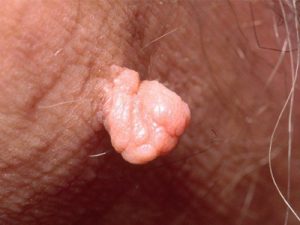Vaginal skin tags, also called vaginal soft tissue tags, are fleshy outgrowths that protrude from the vagina and are often mistaken as genital warts. These skin tags have no relation to any form of STD or genital warts in any way; however, their appearance can be slightly alarming. The causes of vaginal skin tags, their symptoms, and ways to get rid of them are detailed below to help you identify if you have them and what you can do about them.
Thousands of women all over the world struggle with vaginal skin tags every day, and many aren’t even aware that they have them, since the growths are located on the most sensitive part of their bodies. However, skin tags in the vaginal area are rather common and should be checked out by your doctor if you experience itching, tenderness or discomfort in that area. This article will teach you everything you need to know about vaginal skin tags – what they are, what causes them and how to get rid of them once and for all.
SIMPLE WAYS TO EFFECTIVELY GET RID OF PIMPLES
What are vaginal skin tags?

Skin tags (also known as acrochordons) are small growths of tissue that can appear anywhere on your body. Although they’re harmless and relatively common, people usually want to remove them for cosmetic reasons. Luckily, skin tags are entirely benign and can be treated easily with a procedure called electrocautery excisional surgery (commonly referred to as freezing). Doctors do NOT recommend burning or cutting off skin tags at home because serious complications could arise. If you have problems with vaginal skin tags you should go see your doctor immediately so you don’t risk infections or other serious issues. Treatment options will vary depending on your location and condition; talk to your doctor about what would be best for you.
Causes of vaginal skin tags
Vaginal skin tags are caused by irritation and inflammation in a specific area of your vagina. For example, they can be caused by sores that don’t heal or itching that doesn’t go away (usually due to yeast infections). Yeast infections are common when you have other conditions like diabetes or bacterial vaginosis. Skin tags can also be caused by sexual activity that irritates your vagina so much it creates raised bumps on your vaginal walls; these bumps could grow together and become a skin tag.
Vaginal skin tags- Symptoms
Skin tags are formed when your body’s growth-hormone receptors detect a surge of hormones during puberty. One thing skin tags have in common with genital skin tags is that both can be removed for cosmetic reasons. Symptoms include excessive bleeding and sensitivity to sexual touch. In fact, some women only discover they have a vaginal skin tag after pain during intercourse indicates an underlying issue. If you suspect you may have vaginal skin tags or other gynaecological conditions, schedule an appointment with your doctor today.
Skin And Beauty (How To Take Care Of Your Skin)
Treatments available
Treatment options for vaginal skin tags are limited. The American Academy of Dermatology says freezing your tag off with liquid nitrogen is one way to rid yourself of a skin tag at home. Your doctor may also apply diathermy coagulation (heating it up) or excision (cutting it off). Another method doctors use to remove vagina skin tags is cutting out a tiny part of your skin around each tag and using stitches to pull it off. All three procedures have about a 90 per cent success rate for getting rid of vaginal skin tags in six months or less, according to an AAAD study published in 2013. However, you may not see any change from treatment immediately after having one done and need multiple sessions depending on how many moles you have and their size.
Things you can do at home
Look for these skin tags during routine self-exams. If you find a small bump on your vagina or vulva, examine it closely to see if it’s a skin tag. If so, there are things you can do at home (it won’t hurt) to get rid of them. Use soap and water or an anti-fungal cream or powder (ask your OB/GYN about which brands are best) to treat them and be gentle with them when you pull on them or pinch them off—they can be super sensitive!
[convertkit_form]
